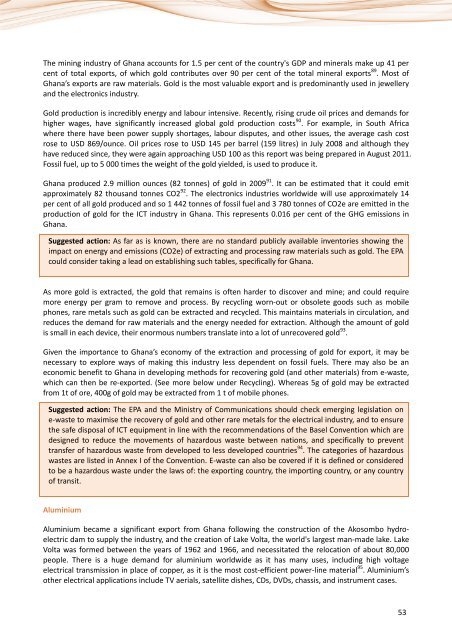Information and communication technologies (ICTs) and ... - ITU
Information and communication technologies (ICTs) and ... - ITU
Information and communication technologies (ICTs) and ... - ITU
You also want an ePaper? Increase the reach of your titles
YUMPU automatically turns print PDFs into web optimized ePapers that Google loves.
The mining industry of Ghana accounts for 1.5 per cent of the country's GDP <strong>and</strong> minerals make up 41 per<br />
cent of total exports, of which gold contributes over 90 per cent of the total mineral exports 89 . Most of<br />
Ghana’s exports are raw materials. Gold is the most valuable export <strong>and</strong> is predominantly used in jewellery<br />
<strong>and</strong> the electronics industry.<br />
Gold production is incredibly energy <strong>and</strong> labour intensive. Recently, rising crude oil prices <strong>and</strong> dem<strong>and</strong>s for<br />
higher wages, have significantly increased global gold production costs 90 . For example, in South Africa<br />
where there have been power supply shortages, labour disputes, <strong>and</strong> other issues, the average cash cost<br />
rose to USD 869/ounce. Oil prices rose to USD 145 per barrel (159 litres) in July 2008 <strong>and</strong> although they<br />
have reduced since, they were again approaching USD 100 as this report was being prepared in August 2011.<br />
Fossil fuel, up to 5 000 times the weight of the gold yielded, is used to produce it.<br />
Ghana produced 2.9 million ounces (82 tonnes) of gold in 2009 91 . It can be estimated that it could emit<br />
approximately 82 thous<strong>and</strong> tonnes CO2 92 . The electronics industries worldwide will use approximately 14<br />
per cent of all gold produced <strong>and</strong> so 1 442 tonnes of fossil fuel <strong>and</strong> 3 780 tonnes of CO2e are emitted in the<br />
production of gold for the ICT industry in Ghana. This represents 0.016 per cent of the GHG emissions in<br />
Ghana.<br />
Suggested action: As far as is known, there are no st<strong>and</strong>ard publicly available inventories showing the<br />
impact on energy <strong>and</strong> emissions (CO2e) of extracting <strong>and</strong> processing raw materials such as gold. The EPA<br />
could consider taking a lead on establishing such tables, specifically for Ghana.<br />
As more gold is extracted, the gold that remains is often harder to discover <strong>and</strong> mine; <strong>and</strong> could require<br />
more energy per gram to remove <strong>and</strong> process. By recycling worn-out or obsolete goods such as mobile<br />
phones, rare metals such as gold can be extracted <strong>and</strong> recycled. This maintains materials in circulation, <strong>and</strong><br />
reduces the dem<strong>and</strong> for raw materials <strong>and</strong> the energy needed for extraction. Although the amount of gold<br />
is small in each device, their enormous numbers translate into a lot of unrecovered gold 93 .<br />
Given the importance to Ghana’s economy of the extraction <strong>and</strong> processing of gold for export, it may be<br />
necessary to explore ways of making this industry less dependent on fossil fuels. There may also be an<br />
economic benefit to Ghana in developing methods for recovering gold (<strong>and</strong> other materials) from e-waste,<br />
which can then be re-exported. (See more below under Recycling). Whereas 5g of gold may be extracted<br />
from 1t of ore, 400g of gold may be extracted from 1 t of mobile phones.<br />
Suggested action: The EPA <strong>and</strong> the Ministry of Communications should check emerging legislation on<br />
e-waste to maximise the recovery of gold <strong>and</strong> other rare metals for the electrical industry, <strong>and</strong> to ensure<br />
the safe disposal of ICT equipment in line with the recommendations of the Basel Convention which are<br />
designed to reduce the movements of hazardous waste between nations, <strong>and</strong> specifically to prevent<br />
transfer of hazardous waste from developed to less developed countries 94 . The categories of hazardous<br />
wastes are listed in Annex I of the Convention. E-waste can also be covered if it is defined or considered<br />
to be a hazardous waste under the laws of: the exporting country, the importing country, or any country<br />
of transit.<br />
Aluminium<br />
Aluminium became a significant export from Ghana following the construction of the Akosombo hydroelectric<br />
dam to supply the industry, <strong>and</strong> the creation of Lake Volta, the world's largest man-made lake. Lake<br />
Volta was formed between the years of 1962 <strong>and</strong> 1966, <strong>and</strong> necessitated the relocation of about 80,000<br />
people. There is a huge dem<strong>and</strong> for aluminium worldwide as it has many uses, including high voltage<br />
electrical transmission in place of copper, as it is the most cost-efficient power-line material 95 . Aluminium’s<br />
other electrical applications include TV aerials, satellite dishes, CDs, DVDs, chassis, <strong>and</strong> instrument cases.<br />
53

















